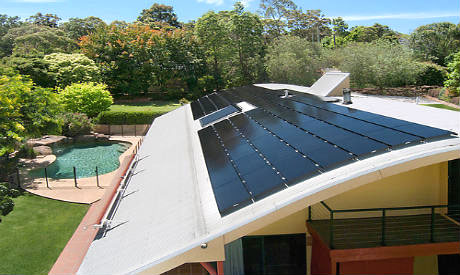
Are you looking for more sustainable energy sources to use in the home? Solar power is a viable way to reduce your carbon foot print and your monthly energy bills! So, how does one get started? Follow these simple steps on how to go solar. Whether you live in an apartment or a sprawling mansion, there is something for every budding environmentalist.
What is solar energy?
According to the United States Environmental Protection Agency, solar energy is defined as the use of the sun as fuel to create heat or electricity. Solar energy is deemed renewable and environmentally sound since the sun will always shine and there is no need to burn fossil fuels to harness it. However, since the sun is not always available as on rainy days or at night, it is called an intermittent source of energy.
Learn about solar energy
How is it harnessed? Go to The US Department of Energy to learn all about energy sources-including solar energy. You can peruse the information on the latest projects and initiatives going on around the United States in regards to sustainable energy. There is an excellent section on resources and links for more information
Conduct an energy audit
Second step is to find out how you can save energy in general. You can hire a contractor or learn more about energy saving tips for appliances and such in the home. Once you’ve shaved off some kilowatts of power, you can then assess how much energy you’d need powered by solar energy. These calculations would help you determine the use of solar panels and other devices in the home.
Decide the proper size and location
This is where you determine what is best for your situation. There are roof top solar panels that receive the most direct sunlight and therefore harness the most power or other options, such as stand-alone units for the back yard.
Speak to a professional
Find a qualified contractor who is part of a local affiliation, such as the Better Business Bureau, licensed and legitimate and preferably part of the North American Board of Certified Energy Practitioners. They will help you figure out the installation plan for your home.
Budgetary concerns
If you want to do something but don’t have the budget for a large undertaking, check out these inexpensive ideas for a do it yourself solar kit for $600. Or read this interesting blog from someone harnessing solar power in their own apartment using a windowsill! The Build It Solar website is for the tried and true do-it-your-selfer.
Financial Incentives
There are numerous financial incentives and programs put forth by government agencies. Check your state for local programs that will save you money and help you through the process of using solar energy. The Community Environmental Council has resources and information on how to tap into the financial support. You can also read about how the CEC is helping to “solarize” different states.
Armed with this information you can decide whether you’d like to go full tilt into alternative energy sourcing or whether you’d like to experiment a few kilowatts at a time.
Photo Credit: Solar Shop




